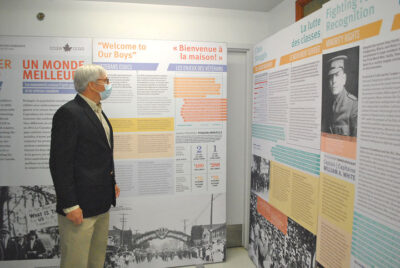New military museum exhibit opens
By Tim Kalinowski on October 5, 2021.
 Herald photo by Tim Kalinowski
Lethbridge Military Museum chair Ray Romses gives local media a first glimpse of the museum's new "A Better World: Post-War Social Movements and the Canadian Veteran" exhibition, which runs until Remembrance Day.
Herald photo by Tim Kalinowski
Lethbridge Military Museum chair Ray Romses gives local media a first glimpse of the museum's new "A Better World: Post-War Social Movements and the Canadian Veteran" exhibition, which runs until Remembrance Day.LETHBRIDGE HERALDtkalinowski@lethbridgeherald.com
The Lethbridge Military Museum officially opened its latest exhibit “A Better World: Post-War Social Movements and the Canadian Veteran” at the Vimy Ridge Armoury on Monday.
The display focuses on the turbulent times just after the First World War continuing up to the time of the Second World War, and the efforts returning soldiers made to create the more pluralistic society we enjoy today.
The end of the First World War ushered in a time of social upheaval unlike almost any other time in history.
Returning soldiers came home to find an economy in shambles, a raging Spanish Flu pandemic and drought.
Over the next 20 years the labour movement would begin to mobilize in a substantial way coming hard on the heels of a rise in communism in Eastern Europe. Women and tenants won the right to vote for the first time, and the hyper inflation of the Roaring Twenties gave way to the Great Depression which led to the Second World War.
Minorities hitherto considered second class citizens in Canada leveraged their wartime service to win substantial rights and recognition from society.
“It tells the story of the veterans when they come home, and what they do to change the world,” explains Maj. Robert Mein, commander of the 20th Independent Field Battery in Lethbridge. “Remembrance Day is about those that fell, and didn’t come home at all. I think that’s a big part of the memories of those who served; that they came back remembering all those who didn’t get a chance to live their life. And so I think a lot of people feel the need to pay back that debt, or to at least live a better life, because so many of their fellow soldiers didn’t get a chance to come home and to have a life. It seems to be the (First World War) veterans really step forward and really make an effort to transform Canada.”
Lethbridge Historical Society president Belinda Crowson agrees.
“It is unbelievable when you look back 100 years ago how many things they were dealing with from Prohibition, from changing and voting rights for woman, from drought and recessions, from labour issues, and all sorts of things,” she says. “When the returning veterans came, they had to find a way to deal with those issues, and to make the world better at the same time.”
The travelling exhibit talks about the broader social changes returning First World War veterans helped encourage in the post-war years; however Crowson says, with a little bit of research, there are many local examples one can see the same forces at work upon.
She cites the example of Lethbridge-based veteran George Palmer who got heavily involved in the labour movement on his return from the war through the One Big Union in the 1920s, which organized the Winnipeg General Strike, and eventually the Farmers Unity League in 1934-1935, which organized the first sugar beet workers union in southern Alberta. Palmer was actually tarred and feathered in central Alberta because of his strong support of the Alberta Wheat Strike during this period
Crowson says the lesson she draws from these stories of the hardships facing returning veterans and other citizens during this time is they came through it all to create a better world in spite of everything they faced. Something we should all keep in mind as we face the current challenges of today, she says.
“We are in a chaotic time right now as well, and the one thing history always teaches us is anything bad they got through,” Crowson states. “Anything we are dealing with, we can get through. So take this also as a motivator and inspiration for what we can do individually, and what we can do as a country and as a community.”
The “A Better World: Post-War Social Movements and the Canadian Veteran” exhibition will run at the Lethbridge Military Museum until Remembrance Day.
For further information visit http://www.lethbridgemilitarymuseum.org
Follow @TimKalHerald on Twitter
4-3




